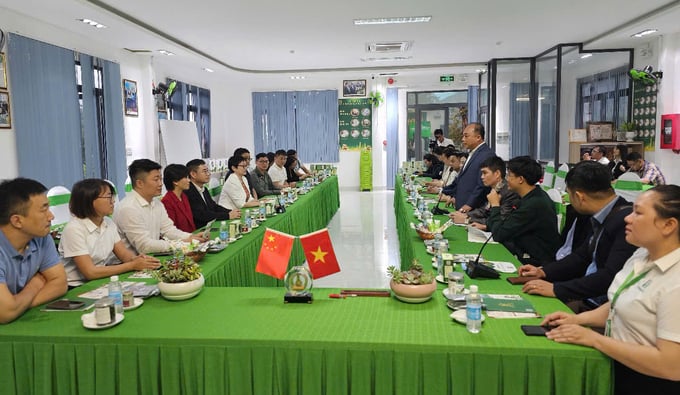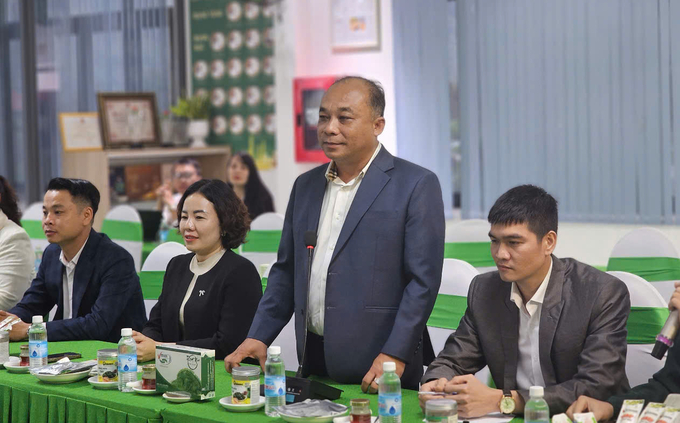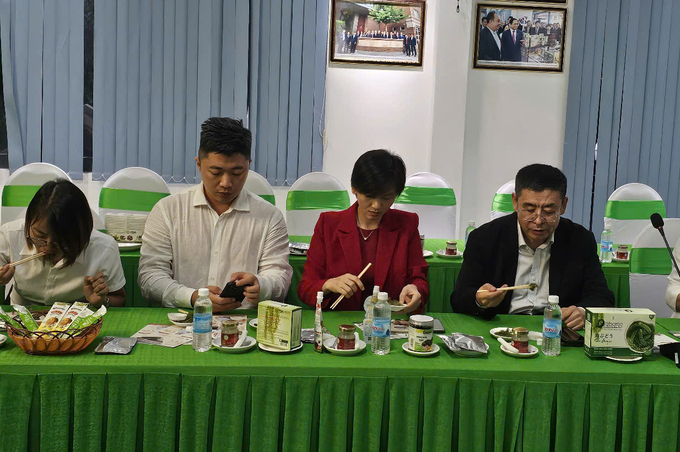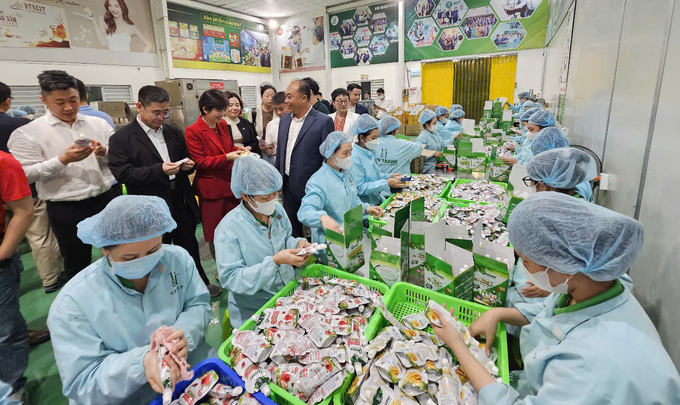December 1, 2025 | 15:27 GMT +7
December 1, 2025 | 15:27 GMT +7
Hotline: 0913.378.918
December 1, 2025 | 15:27 GMT +7
Hotline: 0913.378.918

The businesses learned about DT Group's sea grape production. Photo: KS.
As part of the 2024 Khanh Hoa - Chinese business Connection event, on the afternoon of December 11, a delegation from the Chinese Consulate General in Ho Chi Minh City, along with Chinese businesses, visited and toured the seaweed production facility of D&T Khanh Hoa Seaweed Joint Stock Company (DT Group) in the Dac Loc Industrial Park, Nha Trang City.
Mr. Nguyen Quang Duy, CEO of DT Group, introduced to the Chinese businesses that, in addition to bird’s nest and agarwood, which are characteristic products, Khanh Hoa Province is also blessed by nature with a coastal area that has the ideal temperature and clean water sources, making it possible to produce the highest quality seaweed in the world.

Mr. Nguyen Quang Duy, CEO of DT Group. Photo: KS.
With 14 years of experience in the seaweed industry, DT Group has cultivated and processed many value-added products from sea grapes, such as sea grape snacks, sea grape fruit juice, sea grape jelly, sea grape facial masks, and various health products made from sea grapes. Notably, DT Group's dehydrated sea grape product has been exported to many demanding markets such as the U.S., Japan, and Taiwan.
According to Mr. Duy, DT Group currently operates 2 sea grape processing factories equipped with modern machinery and equipment, with a total capacity of 4 million products per month. Additionally, the company has a product research and development department to meet customer demands for product design and quality. Therefore, if partnering with other businesses, DT Group is fully capable of meeting the partners' requirements.

Chinese businesses taste products made from dehydrated sea grapes. Photo: KS.
During the visit, Chinese businesses gained in-depth insights into the cultivation, care, and processing processes of sea grapes. Particularly, after tasting the products, they were very impressed with the dehydrated sea grape product.
Sharing about this, the CEO of DT Group stated that the company has established a raw material area covering 75 hectares, which has been recognized by the Vietnam Record Organization as having the largest cultivation area and production of Japanese sea grapes in Vietnam since 2020. Additionally, the company has partnered with many local farmers in the South Central provinces to grow sea grapes.
After harvest, the sea grapes are brought to the processing factory and re-cultivated in tanks with treated seawater, which is filtered and purified by an ozone water filtration system to ensure it is clean and free of impurities. The sea grapes are then kept alive for 5 to 7 days to resume metabolic processes, absorb nutrients, and heal any wounds before being moved to the processing area. Afterward, the sea grapes are sorted through a 6-step process to select the best, highest quality stems before being dehydrated and packaged as finished products.

DT Group produced a lot of valueable products from sea grapes. Photo: KS.
"The dehydrated sea grape product is completely preserved with clean-treated saltwater and has a shelf life of one year when stored in a cold environment", Mr. Duy said.
Moreover, the sea grape product is very beneficial to health as it contains high levels of calcium, protein, and omega-3 fatty acids. Therefore, in the near future, DT Group will intensify the production and processing of sea grape products to meet market demand, including the Chinese market.
According to Mr. Duy, many Chinese companies have recently worked with businesses on cooperation to export sea grapes to the billion-people market. DT Group has also promoted trade to this market and observed that people there really enjoy eating seaweed. Therefore, the company is currently completing the necessary procedures to officially export to the Chinese market in 2025.
Translated by Kieu Chi

(VAN) The large-scale agroforestry investment project aims to develop a leading sustainable agro-industrial center in Angola.
/2025/11/28/3433-1-212821_213.jpg)
(VAN) Many localities across the coconut land of Vinh Long are replicating emission-reducing models in production and daily life, contributing to the targets for emission reduction and green economic development.

(VAN) The green transition is an inevitable path for collective economy to achieve balanced growth and align with global trends.

(VAN) The TH Group is not only Vietnam’s leading clean-milk producer; it is also leaving a strong mark on sustainable development as it pursues the goal of carbon neutrality.
/2025/11/27/3830-1-152901_403.jpg)
(VAN) Dong Nai is developing its key crop areas, expanding planting area codes, and applying high technology to increase the value of agricultural products, aiming at a green and sustainable agriculture.

(VAN) Tay Ninh’s livestock sector is undergoing a major transformation, applying high-tech, closed-loop circular models to build sustainable value chains.
/2025/11/26/3627-4-082628_818.jpg)
(VAN) From a small café on the red basalt highlands, Le Van Hoang started a business with clean coffee, building Enjoi Coffee into a symbol of organic agriculture in the Lam Dong plateau.